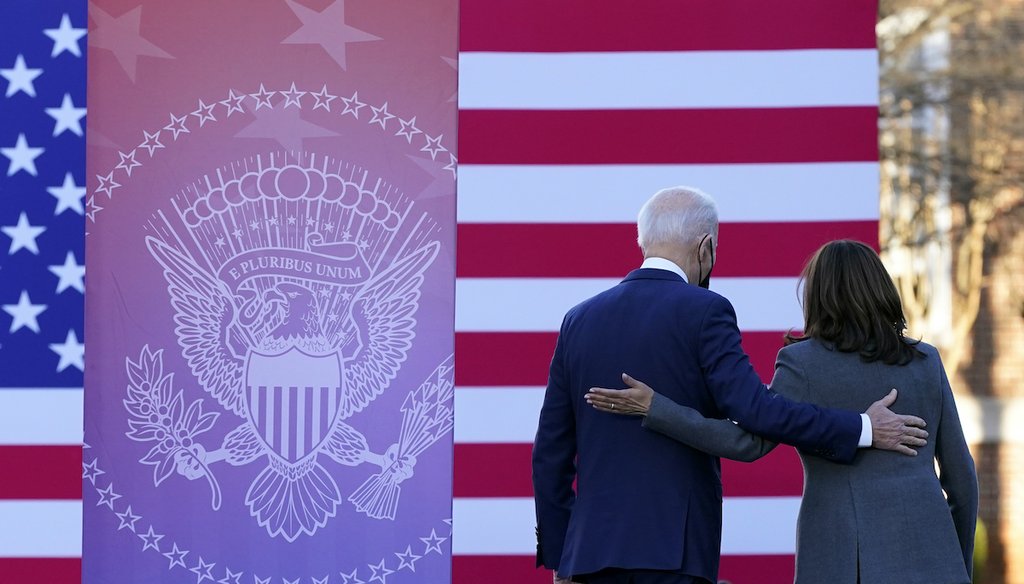Stand up for the facts!
Our only agenda is to publish the truth so you can be an informed participant in democracy.
We need your help.
I would like to contribute

President Joe Biden and Vice President Kamala Harris walk off stage after speaking in support of changing the Senate filibuster rules that have stalled voting rights legislation, at Atlanta University Center Consortium, on Jan. 11, 2022. (AP)
If Your Time is short
- State laws set policies that affect voting rights, including casting ballots by mail and in person. Local election officials are in charge of administering elections by handling mail ballots and operating in person voting sites.
- The federal government can play a role in protecting voting rights, however. The Justice Department can pursue litigation, and the White House can take steps to fund election infrastructure and security.
Many Democrats in Congress were disappointed that they couldn’t muster enough support to pass sweeping voting rights legislation this year. They had hoped for a new law that would protect in-person voting and voting by mail in all 50 states.
But that doesn’t mean the federal government will have to sit on the sidelines when it comes to voting in 2022, even though most election administration happens on the local level.
State laws dictate most ballot access rules for elections, such as who can return completed absentee ballots on behalf of other voters, the amount of days allowed for in-person early voting and how felons who have left prison can regain voting rights.
City and county officials are responsible for implementing those state laws and administering elections. Typically it’s city or county officials who operate in-person voting sites and who send out and process mailed ballots.
We studied election processes and spoke with experts to see what they thought of the federal role in elections in 2022. They identified three areas: challenging new state laws in court, protecting election workers, and funding election infrastructure and security. They also said there’s still a chance that some different form of federal legislation on voting may yet pass this year.
Actions by the Justice Department to challenge state election laws
As a result of Supreme Court rulings during the past decade, the Justice Department has a more narrow path to challenge restrictive state election laws in court. But that doesn’t mean there’s no path. So far, the department has sued Texas and Georgia over voting restrictions, particularly about voting by mail which grew in popularity in 2020.
The department challenged provisions in a Texas law, SB 1, that requires a voter applying for a mail ballot to provide the last four digits of their Social Security number or driver’s license, and that must match registration records.
Thousands of Texas voters have been tripped up by this provision, including a 95-year-old Houston voter who registered decades ago when such identifying numbers were not required. Kenneth Thompson’s applications for a mail ballot were initially rejected, but the matter was resolved when he updated his voter registration record. (After our fact-check was published, Thompson’s daughter told us that his mail ballot finally arrived.)
The lawsuit against Georgia challenges several new rules: the prohibition by groups to provide food and water close to voters waiting in line; the shortening of the deadline to request absentee ballots; and the limits on ballot drop boxes.
"Where we believe the civil rights of Americans have been violated, we will not hesitate to act," Attorney General Merrick Garland said in June when he announced the Georgia lawsuit.
Lawsuits against GOP-led states have faced pushback from Republican politicians, who say state legislatures have the right to set their own laws.
"From my perspective, when the federal government sues Texas and sues Georgia, that’s going in the wrong direction," West Virginia Secretary of State Mac Warner, a Republican, told PolitiFact. "The federal government should be supporting state efforts that are attempting to increase voter confidence."
Fighting state election laws in court is a slow and challenging process that is likely to extend beyond the midterms. But the Justice Department can take other steps, such as offering observers at polling places and investigating intimidation of voters.
Protect elections workers from threats
Threats against election officials nationwide escalated during and after the 2020 elections. The Justice Department launched a law enforcement task force in June that brings together prosecutors, the FBI and Homeland Security to investigate threats.
John D. Keller, a Justice Department official, told a group of state elections officials in August that the federal government’s response so far "has been inadequate" and pledged to do more.
The task force announced cases against two people so far, including a Texas man who called on "Georgia patriots" to kill three officials. Prosecutors said a Nevada man made multiple threatening phone calls to the Nevada Secretary of State’s Office, saying "I hope your children get molested. You are all going to (expletive) die."
Elections officials can also apply for federal grants to pay for extra security for staffers who are at a credible risk of violence.
In September, Reuters documented about 100 threats and found nearly all were inspired by Trump’s false claims that the election was rigged against him. Local police officials told Reuters that they had struggled to identify suspects and determine which threats to prosecute.
Elections offices are left to monitor and report threats on their own and need more support, said Colorado Secretary of State Jena Griswold, chair of the association of the Democratic Association of Secretaries of State.
"It’s clear the federal government must allocate more resources and personnel to the Department of Justice’s task force so it can protect the safety of election officials and proactively address threats against them," Griswold said in a statement to PolitiFact.
Biden could include funding in his budget proposal
A group of Democrats who are secretaries of states wrote a letter in December asking the Biden administration for $5 billion in election infrastructure and security funding for the next year. Many Democrats in the House and Senate have endorsed the idea.
The letter cited a report from the Election Infrastructure Initiative that found needs at the local and state level for the next decade add up to $53 billion for equipment, updating registration records, post-election audits and cybersecurity.
"Election security and integrity are a vital cornerstone of our democracy," the state elections officials wrote. "But because of years of underinvestment by the federal government, too many voters and election workers contend with elections infrastructure that has reached the end of its shelf life."
Elections are managed by 10,000 local jurisdictions, mostly cities and counties, which have to come up with largely their own funding for elections. During the past two decades, federal funding has been inconsistent.
Michigan Secretary of State Jocelyn Benson, a Democrat, said she has met with U.S. senators on both sides of the aisle about the need for federal funding of elections.
"In Michigan, we have no sustained source of long-term funding from the state or federal government for elections," Benson told PolitiFact.
Infrastructure funding is an area where Congress might find bipartisan support. Warner, the West Virginia secretary of state, told PolitiFact, "If Congress were to offer up money I think that most of the Republicans would be in favor of it, as long as it comes without certain strings attached."
Warner said about half of the counties in West Virginia use electronic poll books, a faster process than paper to look up voters’ records on Election Day. Warner said he would like to get federal money to pay for electronic poll books and other equipment.
President Joe Biden issued an executive order in March 2021 that directed federal agencies to expand voter registration and give employees time off to vote, improve the vote.gov website, and give federal prisoners access to voter registration information.
While Biden’s order goes further than previous presidential orders, it has limited impact, according to the Bipartisan Policy Center, because "most of the real reforms that improve voting outcomes need to be implemented through legislation at the state or federal levels."
Congress could draft legislation to prevent election subversion
Congress could yet play a role this year in protecting voting rights. A bipartisan group of senators has announced a proposal to revise the Electoral Count Act of 1887, which lays out the procedures in the Constitution for counting the electoral votes after the presidential election. Lawmakers and experts say it needs clarification, so that state Legislatures can’t do an end run around the voters, as some allies of President Donald Trump attempted in 2020 with a fake slate of electors.
Trump’s comments that Vice President Mike Pence could have overturned the election "underscore the need for us to revise the Electoral Count Act, because they demonstrated the confusion in the law and the fact that it is ambiguous," Sen. Susan Collins, R-Maine, said.
Sen. Amy Klobuchar, D-Minn., is among the senators advocating for her colleagues and the Biden administration to take action this year to protect voting rights.
"The coordinated attacks on our democracy are not letting up, and they demand a federal response," Klobuchar said in a statement to PolitiFact. "We are continuing our fight to protect the freedom to vote on many fronts."
Benson, the Michigan secretary of state, said that while the federal legislation that Democrats wanted didn’t pass, "it should not take up all the oxygen on the issue of what the federal government can do to support states at this particular time, like funding elections."
RELATED: What you need to know about the fake Trump electors
RELATED: All of our fact-checks about elections
Our Sources
Group of Secretaries of State, Letter to President Biden about election funding, Dec. 13, 2021
Group of House members, Letter about election funding, Feb. 1, 2022
Bipartisan Policy Center, What Presidents Can and Cannot Do for Voting Policy in Executive Orders, March 23, 2021
Bipartisan Policy Center, Prioritizing Achievable Federal Election Reform, Jan. 22, 2022
Texas Tribune, Justice Department sues Texas over new voting law, targeting restrictions on mail-in ballots and voter assistance, Nov. 4, 2021
Justice Department, Attorney General Merrick B. Garland Delivers Remarks Announcing Lawsuit Against the State of Georgia to Stop Racially Discriminatory Provisions of New Voting Law, June 25, 2021
Justice Department, Justice Department launches task force to combat threats against election workers, July 2021
Justice Department, Justice Department Files Lawsuit Against the State of Texas to Protect Voting Rights, Nov. 4, 2021
Justice Department, Texas Man Arrested for Making Election-Related Threats to Government Officials, Jan. 21, 2022
Justice Department, Man Charged for Threatening Nevada State Election Worker, Jan. 27, 2022
Election Infrastructure Initiative, New Report Finds That More Than $50 Billion is Needed to Modernize and Run State and Local Elections Infrastructure, Dec. 14, 2021
Sen. Amy Klobuchar, D-Minn., Press release, Feb. 1, 2022
Sen. Amy Klobuchar, Letter to Biden, Feb. 15, 2022
KCRA, Physical threats to elections new focus of Justice Department, state leaders, Aug. 21, 2021
CNN, Senators moving 'aggressively' on Electoral Count Act reform, but face long way to go before a deal, Feb. 1, 2022
Reuters, U.S. election workers get little help from law enforcement as terror threats mount, Sept. 8, 2021
PolitiFact, The Freedom to Vote Act is "a sprawling takeover of our whole political system."Jan. 19, 2022
PolitiFact, Fact-checking Stacey Abrams on a Texas mail-in ballot denial, Feb. 3, 2022
Sen. Amy Klobuchar, Statement to PolitiFact, Feb. 15, 2022
Telephone interview, Norm Eisen, co-chair of States United Action, Feb. 10, 2022
Colorado Secretary of State Jena Griswold, chair of the association of the Democratic Association of Secretaries of State, Statement to PolitiFact, Feb. 10, 2022
Email interview, Wendy Weiser, vice president of Democracy program at the Brennan Center for Justice at NYU, Feb. 15, 2022
Email interview, Rick Hasen, University of California, Irvine, law professor, Feb. 15, 2022
Telephone interview, West Virginia Secretary of State Mac Warner, Feb. 14, 2022
Telephone interview, Michigan Secretary of State Jocelyn Benson, Feb. 9, 2022










































